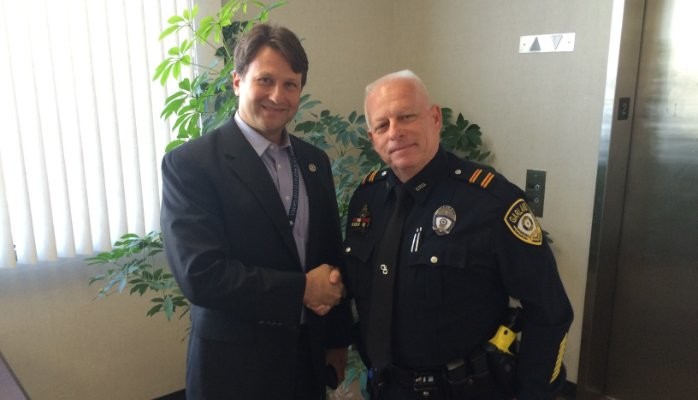
Published by PJ Media
On May 3, 2015, Garland Police Officer Gregory Stevens stood his ground when two heavily armed, ISIS-inspired terrorists jumped out of their car with a plan to murder everyone they could at a free-speech event: A “Draw the Prophet Mohammed” contest.
It happened at the Curtis Caldwell Performing Arts Center entrance Stevens was assigned to guard as an off-duty job. Rather than take cover when body-armored Elton Simpson and Nadir Soofi began their attack with AK-47-style rifles, Stevens advanced while firing his duty handgun and shot them both down. He then reloaded with a borrowed magazine and guarded another part of the campus for a few hours. All 200 attendees and the officers assigned to protect them went home safely that day.
The relatively happy story of the Garland terror attack did not end there. Far from it — which is a good thing for the country.
At least three federal prosecutions related to the 2015 Simpson and Soofi attack have continued to shed important light on how U.S.-based Islamist extremists — and their bit-role sympathizers — network, radicalize, and enable attacks in an underground ether of dangerous hate. These investigations and prosecutions also hopefully provide deterrence to those who might not be suicide-ready but are willing to provide crucial support and cover for those who are, like Simpson and Soofi.
Right now in Phoenix, another Garland-related prosecution of such a person is unfolding.

Abdul Khabir Wahid
In USA v. Abdul Khabir Wahid the government is not pursuing terrorism charges, but rather two charges of lying to the FBI and obstructing its investigation in ways that would protect himself and others who enabled Simpson and Soofi. The trial is set for next month.
According to the March 2017 indictment, Wahid was among a tight circle of Phoenix-area friends in and around Simpson and Soofi. This circle would have included Abdul Malik Abdul Kareem, who was convicted in 2016 on charges related to providing Simpson and Soofi with firearms training, Islamist propaganda, and money to purchase weapons and ammunition. He also egged them on relentlessly to attack non-Muslims ISIS-style.
Kareem’s court files reveal that Wahid was dialed in to all of this, but never breathed a word about it to the police — which would have prevented any attack.
Wahid’s downfall began when he testified as a defense witness for Kareem, and pretty much hung himself. Wahid testified that he called Soofi’s brother, Ali, after the attack to say “don’t talk to the FBI.” He also testified that he was in the car when Kareem purchased a gun with Simpson that was used in the attack.
FBI agents and federal prosecutors no doubt would have taken this testimony into account in light of interviews agents conducted with Wahid right after the attack, during which Wahid spoke to FBI agents as if he knew nothing at all about anything.
One of the two charges in the indictment states Wahid “did knowingly attempt to corruptly persuade another person, A.S. (presumably Ali Soofi) with the intent to hinder, delay, and prevent A.S. from communicating information to law enforcement officers relating to the commission of a federal offense.” This was criminally misleading.
The other charge is related to another lie. Wahid told FBI agents that two days before the Garland attack, Simpson and Soofi visited him at his home — but that they talked about nothing very interesting. He told the agents that Simpson and Soofi brought him some soup, and that they all talked a little about Wahid’s children and how he could be a good Islamic role model for his daughter.
“In truth,” the indictment stated, “Simpson and Soofi also provided Wahid with instructions to deliver an envelope and key to another identified individual for the following Wednesday, May 6, 2015.” That delivery would have been scheduled for after the attack. If Wahid knew nothing about that attack, why would he have hidden this detail about the key and envelope?
Left unclear in any of the court records is what those instructions, envelope, and key were for or to whom they were delivered. I’m curious if this mystery will be unraveled at next month’s trial.
Wahid, a U.S. citizen born in Pennsylvania, is proving to be a strange bird. He is defending himself against the charges, filing a series of motions that suggest he adheres to “sovereign citizen” beliefs in which courts have no jurisdiction over him.
Federal prosecutors and the FBI in Arizona are to be commended for pushing to punish every last inch of the Garland attack. This relentlessness is a significant weapon in the domestic war on terrorism.
I have nothing kind to say about the media coverage. A Google news search shows only a few articles published in Arizona about the original indictment in 2017, and not a word since. The absence of attention to this case and others is unfortunate. Along with tenacious investigation and prosecution, news coverage plays an important role in helping the country understand how bit players crucially enable homegrown Islamic attacks. Such coverage also provides meaningful deterrence.
Follow Todd Bensman on Twitter: @BensmanTodd